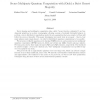64 search results - page 7 / 13 » Secure multi-party quantum computation |
133
Voted
TCC
2004
Springer
15 years 8 months ago
2004
Springer
Quantum 2-party cryptography differs from its classical counterpart in at least one important way: Given blak-box access to a perfect commitment scheme there exists a secure 1−2...
117
click to vote
EUROCRYPT
2001
Springer
15 years 7 months ago
2001
Springer
In this paper we show how to convert a statistically binding but computationally concealing quantum bit commitment scheme into a computationally binding but statistically concealin...
121
click to vote
FOCS
2006
IEEE
15 years 9 months ago
2006
IEEE
Secret sharing and multiparty computation (also called “secure function evaluation”) are fundamental primitives in modern cryptography, allowing a group of mutually distrustfu...
137
click to vote
ICALP
2001
Springer
15 years 7 months ago
2001
Springer
We consider a model of learning Boolean functions from quantum membership queries. This model was studied in [26], where it was shown that any class of Boolean functions which is i...
143
click to vote
EUROCRYPT
2011
Springer
14 years 6 months ago
2011
Springer
Abstract. NTRUEncrypt, proposed in 1996 by Hostein, Pipher and Silverman, is the fastest known lattice-based encryption scheme. Its moderate key-sizes, excellent asymptotic perfor...

